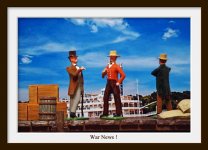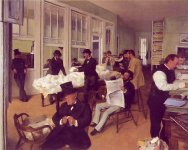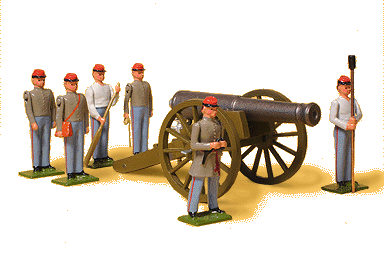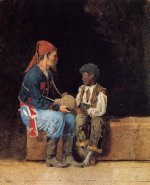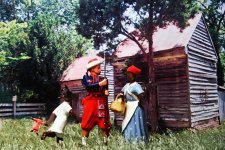Thank you Brad and Scott for your clarification on the outbreak of war in 1861.
Here is Lincoln's April 15th Proclamation and an article about it:
PRESIDENT'S PROCLAMATION.
WASHINGTON, D. C., April 15, 1861.
WHEREAS, The laws of the United States have been and are opposed in several States by combinations too powerful to be suppressed in the ordinary way, I therefore call for the militia of the several States of the Union, to the aggregate number of 75,000, to suppress said combination and execute the laws. I appeal to all loyal citizens to facilitate and aid this effort, and maintain the laws and integrity of the National Union and the perpetuity of popular government, and redress wrongs long endured. The first service assigned will probably be to repossess the forts, places and property which have been seized from the Union. The utmost care will be taken, consistent with the object, to avoid devastation, destruction or interference of peaceful citizens in any part of the country; and I hereby command the persons composing the aforesaid combinations to disperse within twenty days from this date. I hereby convene both Houses of Congress for the 4th of July next, to determine upon such measures as the public safety and interest may demand.
(Signed) ABRAHAM LINCOLN, President of United States.
By W. H. SEWARD, Secretary of State.
Lincoln's Proclamation of April 15, 1861
The President Called for Volunteers to Force Southern Compliance
May 3, 2009 Michael Streich
The April 1861 Proclamation was not a war declaration, although Southern States would respond to it as if it was, setting the stage for a long and bloody conflict.
On April 15th, 1861, President Abraham Lincoln issued a Proclamation that called for 75,000 men from the various states “in order to suppress said combinations…” The Proclamation followed the surrender of Fort Sumter in Charleston, South Carolina after P.T. Beauregard’s bombardment. The South had fired the first shot, outraging the North. Excepting the Border States, Lincoln’s Proclamation was well-received but it would be weeks before the mostly untrained militia arrived in the nation’s capital.
Scope of the Proclamation
Lincoln opened the Proclamation by addressing the needs for his actions. The Laws of the United States were opposed and their execution “obstructed.” Lincoln listed the offending states: South Carolina, Georgia, Alabama, Florida, Mississippi, Louisiana, and Texas. These “combinations” represented a force too powerful to be dealt with through ordinary channels of compliance such as the judiciary and the Federal Marshals.
The language of the Proclamation indicates that Lincoln viewed his response as a “police action” designed to “repossess” Federal property, i.e., forts, armories, and other assets. This was not a “Civil War” but an “insurrection.” There was to be no “…devastation…destruction…or interference with property, or any disturbance of peaceful citizens…” Lincoln was well aware that pro-Union sentiment still existed in the South.
Lincoln, in calling a special July session of Congress, referred to unfolding events as “an extraordinary occasion.” As Commander-in-Chief, Lincoln believed that the Constitution supported his call for state militia volunteers to serve in the armies being planned in defense of Washington and the securing of Border States like Kentucky and Missouri.
As the Proclamation resulted in an outpouring of support and unity in the North, it extinguished lingering pro-Union sympathies in the South. Governor Jackson of Missouri replied to Lincoln that his request for men was “illegal” and “unconstitutional.” Both sides rushed to enlist men, dooming Lincoln’s “police action.” The April 27th, 1861 Harper’s Weekly commented that, “Nobody – outside of lunatic asylums – doubts that civil war is an enormous calamity.”
Results of the Proclamation
Initial plans by the end of April suggested three separate army groups. The first, under the command of General Scott, would defend Washington with 50,000 men. A “New York Army” commanded by General Wood would be held in reserve while General Sumner was to encamp around the Cincinnati area with 75,000 men to protect the river systems, ultimately enabling Union troops to control the Mississippi. (“The War,” Harper’s Weekly, April 27, 1861)
Most of the soldiers arriving from various Northern states were ill-trained. It took the troops several weeks to reach Washington, facing hostile opposition in Baltimore. Additionally, some of the army’s best officers resigned their commissions and returned to the South, as did Robert E. Lee, for example. The navy, it was predicted, would ensure that all Southern ports would be “hermetically sealed.”
In the South in the weeks following the Proclamation, war plans were also being refined. William T. Sherman, who visited Virginia months before these events, had already reported then that the South was preparing for war. General Beauregard wanted to attack Washington with 32,000 men but was overruled by Jefferson Davis on advice from Robert E. Lee. Although the advice was given based on military considerations, Davis did not want to be the aggressor, falling back on his oft repeated phrase, “I hope they leave us alone.”
The Proclamation Not a Call to War
Lincoln’s purposes were very clear: the Proclamation was not a call to war nor was it a war declaration – only the Congress can declare war. Any such war declaration would have legitimized the Confederate States of America. For Lincoln, the Proclamation was a carefully worded document aimed at recovering Federal property and forcing insurrectionists to comply with Federal law. It was the South that construed the Proclamation as a war declaration and responded accordingly.
Sources:
• Harper’s Weekly, April 27, 1861 (President Lincoln’s Proclamation reprinted, commentary, and daily news)
• Shelby Foote, The Civil War: Fort Sumter to Perryville (Vintage Books – Random House, 1986)


